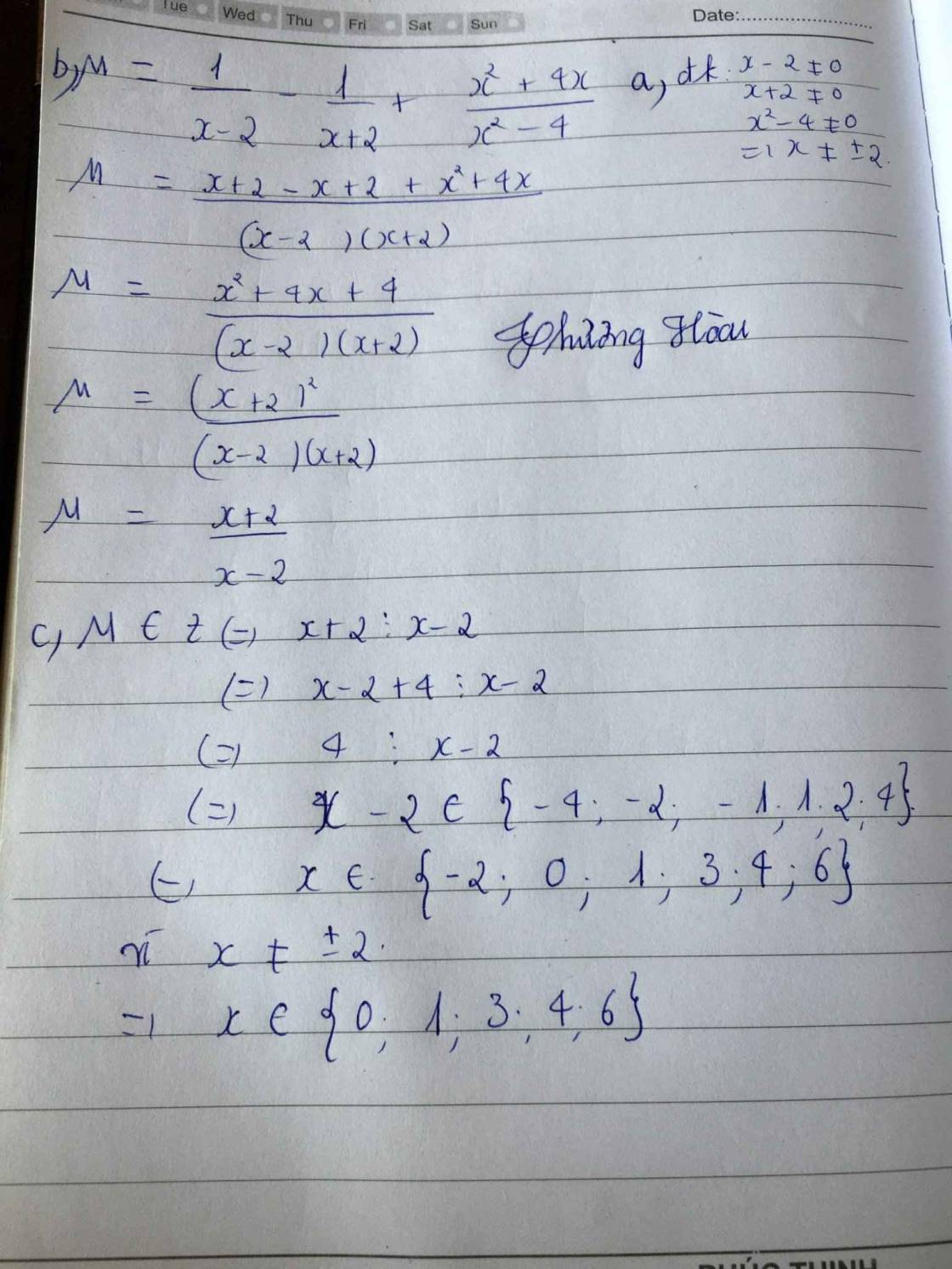Hãy nhập câu hỏi của bạn vào đây, nếu là tài khoản VIP, bạn sẽ được ưu tiên trả lời.

Điều kiện xác định của \(P\)là:
\(\hept{\begin{cases}x^2+2x+1\ne0\\x^2-1\ne0\\x\ne0\end{cases}}\Leftrightarrow\hept{\begin{cases}x\ne\pm1\\x\ne0\end{cases}}\)
\(P=\left(\frac{2+x}{x^2+2x+1}-\frac{x-2}{x^2-1}\right).\frac{1-x^2}{x}\)
\(=\left[\frac{\left(x+2\right)\left(x-1\right)}{\left(x+1\right)^2\left(x-1\right)}-\frac{\left(x-2\right)\left(x+1\right)}{\left(x+1\right)^2\left(x-1\right)}\right].\frac{1-x^2}{x}\)
\(=\frac{2x}{\left(x+1\right)^2\left(x-1\right)}.\frac{1-x^2}{x}=\frac{-2}{x+1}\)
Để \(P\)nguyên mà \(x\)nguyên suy ra \(x+1\inƯ\left(2\right)=\left\{-2,-1,1,2\right\}\Leftrightarrow x\in\left\{-3,-2,0,1\right\}\)
Đối chiếu điều kiện ta được \(x\in\left\{-3,-2\right\}\)thỏa mãn.

M xác định
\(\Leftrightarrow\hept{\begin{cases}x-1\ne0\\x^2-x\ne0\end{cases}\Leftrightarrow}\hept{\begin{cases}x\ne1\\x\left(x-1\right)\ne0\end{cases}\Leftrightarrow\hept{\begin{cases}x\ne1\\x\ne0;x\ne1\end{cases}}\Leftrightarrow}\hept{\begin{cases}x\ne1\\x\ne0\end{cases}}\)
Vậy ĐKXĐ của M là \(\hept{\begin{cases}x\ne1\\x\ne0\end{cases}}\)
\(M=\frac{3}{x-1}+\frac{1}{x^2-x}=\frac{3}{x-1}+\frac{1}{x\left(x-1\right)}=\frac{3x}{x\left(x-1\right)}+\frac{1}{x\left(x-1\right)}=\frac{3x+1}{x\left(x-1\right)}\)
Thay x=5 ta có:
\(M=\frac{3.5+1}{5\left(5-1\right)}=\frac{15+1}{5.4}=\frac{16}{20}=\frac{4}{5}\)
Vậy \(M=5\)tại x=5
\(M=0\)
\(\Leftrightarrow\frac{3x+1}{x\left(x-1\right)}=0\Leftrightarrow3x+1=0\Leftrightarrow x=-\frac{1}{3}\)( thỏa mãn đkxđ)
Vậy với \(x=-\frac{1}{3}\)thì \(M=0\)
\(M=-1\)
\(\Leftrightarrow\frac{3x+1}{x\left(x-1\right)}=-1\Leftrightarrow3x+1=-x^2+x\Leftrightarrow x^2+2x+1=0\Leftrightarrow\left(x+1\right)^2=0\Leftrightarrow x=-1\)
Vậy với \(x=-1\)thì \(M=-1\)

a: ĐKXĐ: \(x\notin\left\{-\dfrac{1}{2};\dfrac{1}{2};-2\right\}\)
b: \(B=\dfrac{4x^2+4x+1-4-4x^2+4x-1}{\left(2x-1\right)\left(2x+1\right)}\cdot\dfrac{2x+1}{x+2}\)
\(=\dfrac{8x-4}{2x-1}\cdot\dfrac{1}{x+2}=\dfrac{4}{x+2}\)

a, ĐKXĐ: x\(\ne\) 1;-1;2
b, A= \(\left(\frac{x}{x+1}+\frac{1}{x-1}-\frac{4x}{2-2x^2}\right):\frac{x+1}{x-2}\)
=\(\left(\frac{2x^2-2x}{2\left(x+1\right)\left(x-1\right)}+\frac{2x+2}{2\left(x+1\right)\left(x-1\right)}+\frac{4x}{2\left(x-1\right)\left(x+1\right)}\right)\times\frac{x-2}{x+1}\)
=\(\frac{2x^2-2x+2x+2+4x}{2\left(x+1\right)\left(x-1\right)}\times\frac{x-2}{x+1}\)
=\(\frac{2x^2+4x+2}{2\left(x+1\right)\left(x-1\right)}\times\frac{x-2}{x+1}\)
=\(\frac{2\left(x+1\right)^2}{2\left(x+1\right)\left(x-1\right)}\times\frac{x-2}{x+1}\)
=\(\frac{x-2}{x-1}\)
c, Khi x= -1
→A= \(\frac{-1-2}{-1-1}\)
= -3
Vậy khi x= -1 thì A= -3
Câu d thì mình đang suy nghĩ nhé, mình sẽ quay lại trả lời sau ^^
a,ĐKXĐ:x#1; x#-1; x#2
b,Ta có:
A=\(\left(\frac{x}{x+1}+\frac{1}{x-1}-\frac{4x}{2-2x^2}\right):\frac{x+1}{x-2}\)
=\(\left(\frac{x\left(x-1\right)2}{\left(x+1\right)\left(x-1\right)2}+\frac{\left(x+1\right)2}{\left(x-1\right)\left(x+1\right)2}+\frac{4x}{2\left(x-1\right)\left(x+1\right)}\right):\frac{x+1}{x-2}\)
=\(\frac{2x^2-2x+2x+2+4x}{\left(x+1\right)\left(x-1\right)2}.\frac{x-2}{x+1}\)
=\(\frac{2x^2+4x+2}{\left(x+1\right)\left(x-1\right)2}.\frac{x-2}{x+1}\)
=\(\frac{2\left(x+1\right)^2}{\left(x+1\right)\left(x-1\right)2}.\frac{x-2}{x+1}\)
=\(\frac{x-2}{x+1}\)
c,Tại x=-1 ,theo ĐKXĐ x#-1 \(\Rightarrow\)A không có kết quả
d,Để A có giá trị nguyên \(\Rightarrow\frac{x-2}{x+1}\)có giá trị nguyên
\(\Leftrightarrow x-2⋮x+1\)
\(\Leftrightarrow x+1-3⋮x+1\)
Mà \(x+1⋮x+1\Rightarrow3⋮x+1\)
\(\Rightarrow x+1\inƯ\left(3\right)=\left\{1;-1;3;-3\right\}\)
\(\Rightarrow x\in\left\{0;-2;2;-4\right\}\)
Mà theo ĐKXĐ x#2\(\Rightarrow x\in\left\{0;-2;-4\right\}\)
Vậy \(x\in\left\{0;-2;-4\right\}\)thì a là số nguyên

\(P=\left(\frac{2+x}{x^2+2x+1}-\frac{x-2}{x^2-1}\right).\frac{1-x^2}{x}\)
a) ĐKXĐ:
\(\hept{\begin{cases}x^2+2x+1\ne0\\x^2-1\ne0\\x\ne0\end{cases}}\Leftrightarrow\hept{\begin{cases}\left(x+1\right)^2\ne0\\\left(x-1\right)\left(x+1\right)\ne0\\x\ne0\end{cases}\Leftrightarrow\hept{\begin{cases}x+1\ne0\\x\ne1;x\ne-1\\x\ne0\end{cases}}}\)
<=> x khác -1
x khác 1; x khác -1
x khác 0
<=> x khác -1;1;0
Vậy ĐKXĐ là x khác -1;1;0
b) \(P=\left(\frac{2+x}{x^2+2x+1}-\frac{x-2}{x^2-1}\right).\frac{1-x^2}{x}\)
\(\Rightarrow P=\left(\frac{2+x}{\left(x+1\right)^2_{x-1}}-\frac{x-2}{\left(x-1\right)\left(x+1\right)_{x+1}}\right).\frac{1-x}{x}\)
MTC: (x+1)^2(x-1)
\(\Rightarrow P=\left(\frac{\left(2+x\right)\left(x-1\right)}{\left(x+1\right)^2\left(x-1\right)}-\frac{\left(x-2\right)\left(x+1\right)}{\left(x+1\right)^2\left(x-1\right)}\right).\frac{1-x}{x}\)
\(\Rightarrow P=\left(\frac{2x-2+x^2-x}{\left(x+1\right)^2\left(x-1\right)}-\frac{x^2+x-2x-2}{\left(x+1\right)^2\left(x-1\right)}\right)\frac{1-x}{x}\)
\(\Rightarrow P=\left(\frac{x-2+x^2-x^2+x+2}{\left(x+1\right)^2\left(x-1\right)}\right).\frac{1-x}{x}\)
\(\Rightarrow P=\frac{2x}{\left(x+1\right)^2\left(x-1\right)}.\frac{1-x}{x}\)
\(\Rightarrow P=\frac{2x}{-\left(1-x\right)\left(x+1\right)^2}.\frac{1-x}{x}\)
\(\Rightarrow P=-\frac{x}{\left(x+1\right)^2}\) (tmđkxđ)
c)
\(P=-\frac{x}{\left(x+1\right)^2}=-\frac{x+1-1}{\left(x+1\right)\left(x+1\right)}=-\frac{x+1}{x+1}-\frac{1}{x+1}=-1-\frac{1}{x+1}\) ( ĐKXĐ là x khác -1;1;0) \(\left(P\in Z\right)\)
\(P\in Z\Leftrightarrow\frac{-1}{x+1}\)
Nên x+1 thuộc Ư(-1)={1;-1)
x+1=1=>x=1-1=0 ( o t/m đk)
x+1=-1=>x=-1-1=-2( (t/m đk)
<=> x thuộc -2 thì gt của BT P là số nguyên

a) ĐKXĐ: \(\hept{\begin{cases}x+2\ne0\\x^2-4\ne0\\2-x\ne0\end{cases}}\) => \(\hept{\begin{cases}x\ne-2\\x\ne\pm2\\x\ne2\end{cases}}\) => \(x\ne\pm2\)
Ta có:Q = \(\frac{x-1}{x+2}+\frac{4x+4}{x^2-4}+\frac{3}{2-x}\)
Q = \(\frac{\left(x-1\right)\left(x-2\right)}{\left(x+2\right)\left(x-2\right)}+\frac{4x+4}{\left(x-2\right)\left(x+2\right)}-\frac{3\left(x+2\right)}{\left(x-2\right)\left(x+2\right)}\)
Q = \(\frac{x^2-2x-x+2+4x+4-3x-6}{\left(x+2\right)\left(x-2\right)}\)
Q = \(\frac{x^2-2x}{\left(x+2\right)\left(x-2\right)}=\frac{x\left(x-2\right)}{\left(x+2\right)\left(x-2\right)}=\frac{x}{x+2}\)
b) ĐKXĐ P: x - 3 \(\ne\)0 => x \(\ne\)3
Ta có: P = 3 => \(\frac{x+2}{x-3}=3\)
=> x + 2 = 3(x - 3)
=> x + 2 = 3x - 9
=> x - 3x = -9 - 2
=> -2x = -11
=> x = 11/2 (tm)
Với x = 11/2 thay vào Q => Q = \(\frac{\frac{11}{2}}{\frac{11}{2}+2}=\frac{11}{15}\)
c) Với x \(\ne\)\(\pm\)2; x \(\ne\)3
Ta có: M = PQ = \(\frac{x+2}{x-3}\cdot\frac{x}{x+2}=\frac{x}{x-3}=\frac{x-3+3}{x-3}=1+\frac{3}{x-3}\)
Để M \(\in\)Z <=> 3 \(⋮\)x - 3
=> x - 3 \(\in\)Ư(3) = {1; -1; 3; -3}
Lập bảng:
| x - 3 | 1 | -1 | 3 | -3 |
| x | 4 | 2 (ktm) | 6 | 0 |
Vậy ...

a)
\(ĐKXĐ:\left\{{}\begin{matrix}x-2\ne0\\x+2\ne0\\x^2-4\ne0\end{matrix}\right.< =>\left\{{}\begin{matrix}x\ne2\\x\ne-2\end{matrix}\right.\)
b)
\(\dfrac{1}{x-2}-\dfrac{1}{x+2}+\dfrac{x^2+4x}{x^2-4}\)
\(=\dfrac{1}{x-2}-\dfrac{1}{x+2}+\dfrac{x\left(x+4\right)}{\left(x-2\right)\left(x+2\right)}\)
\(=\dfrac{x+2}{\left(x-2\right)\left(x+2\right)}-\dfrac{x-2}{\left(x-2\right)\left(x+2\right)}+\dfrac{x\left(x+4\right)}{\left(x-2\right)\left(x+2\right)}\)
\(=\dfrac{x+2-x+2+x^2+4x}{\left(x-2\right)\left(x+2\right)}\)
\(=\dfrac{x^2+4x+4}{\left(x-2\right)\left(x+2\right)}\\ =\dfrac{\left(x+2\right)^2}{\left(x-2\right)\left(x+2\right)}\\ =\dfrac{x+2}{x-2}\)
c)
\(\dfrac{x+2}{x-2}=\dfrac{x-2+4}{x-2}=\dfrac{x-2}{x-2}+\dfrac{4}{x-2}=1+\dfrac{4}{x-2}\)
vậy M nhận giá trị nguyên thì 4⋮x-2
=> x-2 thuộc ước của 4
\(Ư\left(4\right)\in\left\{-1;1;-2;2;;4;-4\right\}\)
ta có bảng sau
| x-2 | -1 | 1 | -2 | 2 | 4 | -4 |
| x | 1(tm) | 3(tm) | 0(tm) | 4(tm) | 6(tm | -2(loại) |

\(M=\frac{4x+8}{x^2-1}:\frac{x+2}{x+1}-\frac{x-2}{1-x}\) \(ĐKXĐ:x\ne\pm1\)
\(M=\frac{4\left(x+2\right)}{\left(x-1\right)\left(x+1\right)}.\frac{x+1}{x+2}+\frac{x-2}{x-1}\)
\(M=\frac{4}{x-1}+\frac{x-2}{x-1}\)
\(M=\frac{4+x-2}{x-1}\)
\(M=\frac{x+2}{x-1}\)
vậy \(M=\frac{x+2}{x-1}\)